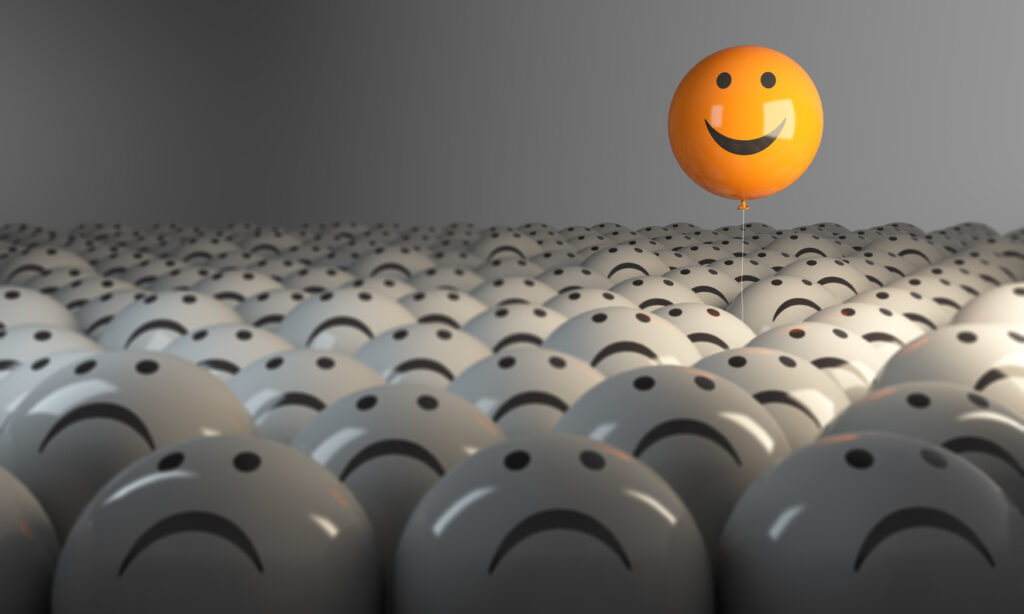Do you have an inner critic? Here’s how your negative, self-doubting thoughts can play out in the workplace and impact productivity.
Over the past ten years of working with employees at different points in their career (leaders and managers included), it has struck me that we all experience, to some degree at some point in our lives, negative self-talk. This is what I call the ‘inner critic’ – and I’m no stranger to it myself.
It’s widely accepted that we have tens of thousands of thoughts a day, most of which are on repeat, and many of which are negative or self-critical (our brain is not wired to be happy). Negative thoughts have a compounding effect: you are more likely to experience self-critical thoughts if you are already feeling worried.
What is the inner critic?
These thoughts tend to be formed from something someone else once said to you, about you, or in front of you that your mind interpreted as true. We internalise other people’s negative judgements, which become our own thoughts.
Self-criticism at an individual level has the potential to impact productivity at an organisational level.
While we readily challenge other people’s ideas and attitudes, we do not challenge our own thinking in this same way. What we think about ourselves affects how we feel, and it impacts our behaviour, including our performance at work.
How does it play out in our life?
Let’s say you want to improve your fitness. You join a gym and promise yourself that you’ll go three times every week until you have reached your fitness target. However, you hate going to the gym, and you always find an excuse not to go – you are too busy, too tired, it’s too late in the evening etc.
Every time you miss a training session your inner critic says ‘I’m so lazy’, ‘I never stick to any of my plans’, and every time you walk up a flight of stairs or have to run for a bus, it reminds you of how unfit you are.
As a result of berating yourself in this way you might feel disappointed in yourself. You might feel that all hope is lost on trying to get fitter and tell yourself that you’d rather be watching Netflix anyway. Or, you might actually go to the gym but continue to beat yourself up about not going even more frequently.
You could even be going every day, but you’d still continue to berate yourself. The inner critic is impossible to turn off.
So how does the inner critic play out in the workplace?
Here’s a list of the most common examples I’ve come across in my work as a business psychologist:
- People who want to raise their profile at work: ‘I’m not qualified enough to do a more senior role’, ‘I don’t come across well at interviews’, ‘I’m so afraid of saying something stupid that I rarely speak in meetings’.
- Those who want to be a more confident communicator: ‘I’m rubbish at doing presentations’, ‘I shouldn’t have said that in front of the customer / senior team’, ‘I get nervous in front of senior managers and they think I’m stupid’, ‘I’m a terrible negotiator’, ‘I’m no good at selling’.
- Leaders and people-managers who are prone to self-critical thinking may think: ‘I’m not a natural leader’, ‘I waste time worrying about what other people think of me’.
- People who doubt their abilities: ‘I’ve never felt comfortable with numbers’, ‘I’m not a strategic thinker’, ‘I’m not very creative’, ‘I should be more organised, I’ll never get this done on time’, ‘I should stop saying yes to every request and stand up for myself more often’.
Not everyone experiences self-criticism. There are people who only experience it when they are under pressure to perform well at a particular task, or when learning something new.
People whose inner critic is switched ‘on’ for most of the time might find it hard to be productive because their cognitive processes are slowed under the stress.
The inner critic needs each one of us to believe that we are the only person having these thoughts.
For example, they can’t think clearly, frequently doubt their decisions, and take more time to make decisions. The same people might begin to withdraw from actively participating in discussions and avoid taking on additional responsibility.
Self-criticism at an individual level has the potential to impact productivity at an organisational level.
Not all organisations understand how to help their employees to feel more confident in themselves. While employees do need to take responsibility for how they feel, there are things that can be done within an organisation to foster an open and supportive culture.
Here are some of my suggestions:
-
Encourage a ‘no blame’ culture: criticising others leads to them criticising themselves. Acknowledge that someone somewhere at some point in the organisation will inevitably make a mistake. Make it easy for people to own up to making mistakes rather than feeling ashamed and hiding the evidence, e.g. train managers to have constructive conversations.
-
Actively demonstrate your company values, e.g. if they advocate ‘we value our employees’ ask yourself how you actually deliver on this and what you could do better to encourage employee’s self-worth and self-confidence.
-
For those individuals who are highly critical of themselves, there are a range of evidence-based psychological techniques that help to reduce the impact of self-criticism, such as disputation and decentering.
And on a personal note…
If you personally experience the inner critic (most of us do) may I suggest that you find someone you trust, and tell them whatever your own inner critic says about you. There’s a high chance that your colleagues, friends and family are experiencing similar destructive thoughts that are diminishing their own self-worth.
You see, the inner critic needs each one of us to believe that we are the only person having these thoughts. By talking about it, we are reducing its impact, and building our own, and others’ self-confidence.






